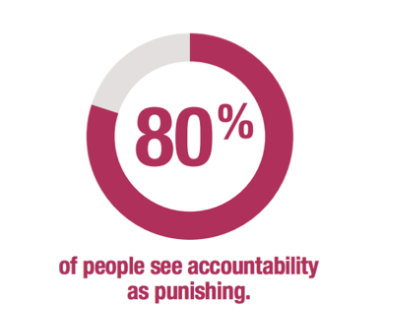
Why Accountability is a Must For Teamwork and How To Create It
“Courtney really gets on my nerves,” Mario said to his coworker Amira. The two were sitting in the commissary, trays of food in front of them, ready to eat lunch.
“She has to be ‘miss perfect’ and flaunt finishing her projects,” Mario continued. “Yet getting her work done before everyone else doesn’t satisfy her—she continually asks other people if they’ve finished their projects yet. It’s like she wants to toss us under the bus every chance she gets.”
“She’s obviously maneuvering for a promotion. Hopefully she’ll get it soon and we can work in peace,” Amira replied. The two began to eat their lunch, Mario wearing an expression of agitation, and Amira simply looking disinterested.
“Ravi on the other hand does absolutely nothing,” said Mario with a sigh.
“I can’t believe Tanya hasn’t said anything to him, even after he missed the RFP deadline. What kind of manager is she? I wish she’d crack down on him,” responded Amira now wearing Mario’s look of agitation on her face.
“Have you finished updating the client files?” Mario asked Amira.
“Not yet,” she replied. “Have you finished the research you were working on?”
“Not yet,” Mario said, bored at the thought of the research. “It will get done eventually.”
“Yeah, we finish when we finish,” Amira said as she stood up with her tray, headed to the trash bin, and prepared herself to get back to work.
Back in the office, Tanya, the team manager, is frustrated. Only one person on her team, Courtney, actually meets deadlines. And now the department head is coming down on her, accusing her of not managing her team properly. How can she get her team to get their work done?
Let’s start by identifying the major problem that is affecting the productivity of this team: lack of accountability.
This Team Has a Problem: Lack of Accountability
The business dictionary defines accountability as “the obligation of an individual or organization to account for its activities, accept responsibility for them, and disclose the results in a transparent manner.” It’s simple: to be accountable to a team, a person needs to be clear about what they plan to do, execute on that thing, and let the team know when it’s done.
But when it comes to teams, accountability must go both ways. For a team to function well, an individual is not only obligated to be accountable, they need to hold their coworkers accountable too. That means consistently asking for updates on clearly defined goals, and openly sharing their own updates. Yet holding others accountable is difficult because it can cause interpersonal discomfort. Patrick Lencioni writes, “Once we achieve clarity and buy-in, it is then that we have to hold each other accountable for what we sign up to do, for high standards of performance and behavior. And as simple as that sounds, most executives hate to do it, especially when it comes to a peer’s behavior.”
In the team above, Courtney is the only one holding herself and others accountable. And she is definitely facing interpersonal discomfort.
The Facts About Accountability in Business
Although being accountable is vital to teamwork, organizations across industries struggle with accountability. Take a look at these statistics:
- 93% of employees don’t really understand what their organization is trying to accomplish in order to align with their own work.
- 85% of leaders aren’t defining what their people should be working on — and an equal number of employees crave clarity.
- 84% of the workforce describes itself as “trying but failing” or “avoiding” accountability, even when employees know what to fix.
- 80% of people see accountability as punishing


These are not small numbers! It looks like many organizations could use a lesson in accountability. Let’s take a look at what teams that hold each other as accountable look like, versus teams that do not.
Accountable Teams and Unaccountable Teams: What do they look like?
Teams That Are Not Accountable
- Create resentment among team members who have different standards of performance
- Encourage mediocrity
- Miss deadlines
- Put disproportionate pressure on leaders to discipline
Teams That Are Accountable
- Make sure poor performers feel pressure to improve
- Identify problems quickly by questioning one another
- Establish respect among team members who are held to same high standards
- Avoid excessive bureaucracy around management and corrective actions
For a real-world example of the problems that come from unaccountable teams, let’s visit the coffeehouse giant, Starbucks.
What Starbucks Can Teach Us About Accountability
During the economic slowdown of 2008, Starbucks took a hit—600 stores closed and profit fell 28%. Leadership during that time blamed the economy and increased price of dairy for the slump. That was until Howard D. Shultz came back as CEO after leaving eight years prior. He held leadership accountable rather than blaming things that can’t be controlled, like the economy and dairy prices. He said, “Starbucks’s heavy spending to accommodate its expansion has created a bureaucracy that masked its problems.”
His solution? To create a strategy that developed brand trust. The initiative, called “My Starbucks Idea,” created a way for customers to share ideas directly with the company and with each other. After 1.3 million users on social media shared 93 million ideas, the program was a success and Starbucks pulled out of its slump. Had Shultz not held the company accountable, it’s unlikely the leadership team would have solved the problem.
So what can you do if you find yourself on a team that is not accountable and Howard Shultz isn’t around? Try these three tips:
Tips For Creating Accountability
1. Set Team Goals and Team Rewards
- People are less likely to watch someone fail if the entire team is at stake
- The enemy of accountability is ambiguity
2. Ask Questions, Stress Inquiry
- Agree on goals and then conduct inquiry-oriented dialogue. Questions help people deconstruct the details and try alternatives without being defensive
3. Break goals into specific elements
- Analyze the details that accumulate to produce either success or failure
- This makes it easier to identify specific steps for improvement
- It gives people pride in the elements that went well
- Helping the team see strengths and weaknesses holds others accountable to improvement
Going back to Mario, Amira, Ravi, Tanya and Courtney’s team, we can see clear signs of a lack of accountability. Mario and Amira resent Courtney for having a different standard of performance. They even encourage each other’s mediocrity with statements like, “we finish when we finish.” The two blame their manager, Tanya, for Ravi’s missed deadline, expecting her to discipline rather than holding their team accountable. And from what Tanya says, the team misses deadlines all the time.
What if they were more accountable? Mario, Amira and Ravi would feel pressure from the team to improve. They’d identify what stood in their way by asking questions and resolving problems quickly. They’d even strip some of the bureaucracy away, by not relying on management’s use discipline to get things done. All of this would help establish respect among the team, which would now be holding each other to higher standards. And what do higher standards mean? Better performance.
Have you ever worked on a team that lacked accountability? What was it like? I’d love to hear about it. Let’s share experiences. Leave a comment below, send me an email, or find me on Twitter.


Leave A Comment